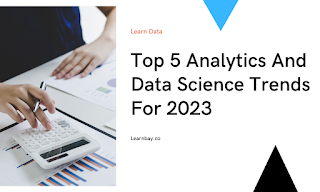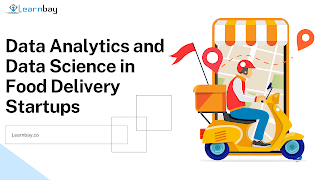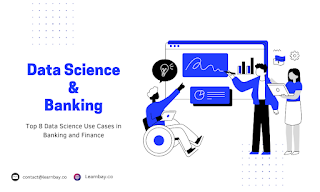Top 5 Analytics And Data Science Trends For 2023
In business, data is used to determine who wins and who loses. Information can now be obtained from various sources, and technology for extracting insights is becoming more user-friendly.
The foundation of the wave of digital change sweeping through every industry in 2023 and beyond is moving to a data-driven business model, where decisions are made based on true data rather than assuming. It aids us in clearly acting when faced with uncertainty, particularly when armed conflicts and pandemics upend the status quo.
The world of analytics and data science, however, is always changing. Access to information is becoming faster and more accurate thanks to emerging technologies. We also offer suggestions for implementing emerging trends in industry and society at large. Here is a list of the main concepts that, in my opinion, will have the largest influence on how data and analytics are used to advance corporate success in 2023 and beyond.
Here are the top data science and analytics trends of 2023
Data Democratization
The increased empowerment of whole workforces to use analytics, as opposed to simply data scientists and engineers, will be one of the most important trends. In order to help everyone perform their professions more successfully and efficiently, data science tools, programs, and devices are pushing smart insights into everyone's hands.
In 2023, businesses will understand the value of data in understanding their customers, developing better products and services, and streamlining internal operations to reduce waste and expenses. It is becoming increasingly obvious that this won't fully occur until frontline, shop floor, and non-technical personnel, as well as departments like marketing and finance, can act on data-driven insights.
Two excellent examples of data democracy in action are using Natural Language Processing (NLP) tools by lawyers to scan pages of legal precedents or by retail sales associates to use hand terminals that can access real-time customer purchase information and make cross- and up-selling recommendations. According to McKinsey research, businesses that provide all of their staff access to data are 40 times more likely to report that analytics has a positive impact on sales.
Artificial Intelligence
The future technological trend that would impact our life or how we live and do our business is called Artificial Intelligence. By using it, business analytics will provide more accurate forecasts, save time on laborious processes like data collecting and cleaning, and let employees act on data-driven insights regardless of their position or level of technical expertise. Visit the business analytics course in Bangalore, to know more about the tools used by business analysts worldwide.
Simply said, AI uses software algorithms that get better at their jobs as they are fed more data to allow organizations to analyze data and derive insights far faster than would ever be possible humanly. The fundamental idea behind machine learning (ML), the type of AI currently employed in business, is this. Computer vision, which enables machines to understand and analyze visual data using cameras, much like people do, and Natural Language Processing (NLP), which enables machines to perceive and communicate with us in human languages with our eyes, and generative AI, which can conceive text, images, sounds, and video from scratch, are some examples of AI and ML technologies.
Cloud and Data-as-a-Service (DSaaS)
In essence, it means that companies can access data sources gathered and vetted by other parties via cloud services with a pay-as-you-go or subscription-based payment model. As a result, companies are less likely to need to create their own expensive, specialized data gathering and storage systems for various applications.
DaaS providers often provide analytics tools as a service in addition to raw data. A company's private data that it collects and processes is generally supplemented with data available through DaaS to produce richer and more useful insights. As it enables organizations to work with data without having to build up and manage expensive and specialized data science operations, it plays a significant role in the democratization of data stated earlier. The market for these services is anticipated to reach a value of $10.7 billion in 2023.
Real-Time Data
While sifting through data in search of insights, it is preferable to be aware of current events rather than those from yesterday, last week, or last month. Because of this, real-time data is increasingly proving to be the most useful source of information for enterprises.
We frequently need more sophisticated data and analytics infrastructure when working with real-time data, which raises the cost but has the benefit of allowing us to act on information as it becomes available.
Determining what offers and promotions to provide website visitors may require analyzing their clickstream data. Alternatively, in the case of financial services, it may entail monitoring transactions as they take place around the world for signs of fraud.
Facebook and other social media platforms analyze hundreds of gigabytes of data every second for various purposes, such as putting up advertisements and halting the spread of false information.
Data Governance and Regulation
Data governance will be a big topic in 2023 as more nations implement legislation to regulate the use of personal and other types of data. Following examples like the European GDPR, Canadian PIPEDA, and Chinese PIPL, other countries are expected to follow suit and pass legislation protecting their citizens' data. In fact, Gartner experts forecast that by 2023, GDPR-like rules will apply to 65% of the world's population.
The government should focus more on internal data processing and handling methods and ensure that they are properly understood and recorded for the upcoming years, no matter where they are situated in the world. Many businesses will be forced to audit the information they now possess, including how it was acquired, where it was stored, and what was done with it.
Even if it seems like more work now, the long-term goal is for everyone to benefit since customers will be more likely to trust businesses with their data if they are certain it will be protected. These companies will then be able to use this knowledge to produce products and services that better suit our needs and are more reasonably priced.
Conclusion
Hope this article was helpful and informative. To become an expert in whatever field you are in, you should be updated daily. Become a data science expert with the help of the best data science course in Bangalore, co-developed by IBM. Learn the in-demand skills and become a competent data scientist in MAANG firms.




Comments
Post a Comment